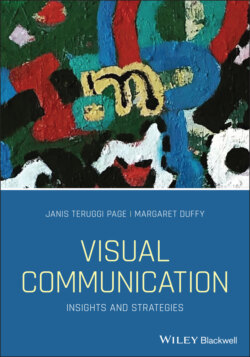Читать книгу Visual Communication - Janis Teruggi Page - Страница 34
REFERENCES
Оглавление1 Anderson, W. (1990). Reality Isn't What it Used to Be. New York, NY: Harper Collins.
2 Bernazzani, S. (n.d.). The 10 best user‐generated content campaigns on Instagram. https://blog.hubspot.com/marketing/best‐user‐generated‐content‐campaigns (accessed September 1, 2020).
3 Central Intelligence Agency. (n.d.) The world factbook. https://www.cia.gov/library/publications/the‐world‐factbook/docs/flagsoftheworld.html# (accessed 1 September 2020).
4 Cisco . (2019).Cisco Visual Networking Index: Forecast and Trends, 2017–2022 White Paper. https://davidellis.ca/wp‐content/uploads/2019/12/cisco‐vni‐mobile‐data‐traffic‐feb‐2019.pdf (accessed November 12, 2020).
5 Claveria, K. (2019). Unlike Millennials: 5 ways Gen Z differs from Gen Y. https://www.prdaily.com/wp‐content/uploads/2018/02/gen‐z‐versus‐millennials‐infographics (accessed November 12, 2020).
6 Constine, J. (2018). Instagram hits 1 billion monthly users, up from 800M in September. https://techcrunch.com/2018/06/20/instagram‐1‐billion‐users (accessed November 12, 2020).
7 Duffy, M., Page, J., and Young, R. (2012). It's just a joke: Racist rhetoric and pass‐along email images of Obama. In: Assessing Evidence in a Postmodern World (ed. B. Brennen), 67–97. Nieman Research Conference Proceedings.
8 Eco, U. (1978). A Theory of Semiotics. Bloomington: Indiana University Press.
9 eMarketer (2015). What is the visual web? http://www.emarketer.com/Article/What‐Visual‐Web/1013064 (accessed October 19, 2019).
10 Geertz, C. (1973). The Interpretation of Culture. New York: Basic Books.
11 Graber, D.A. (1988). Processing the News: How People Tame the Information Tide. New York: Longman.
12 Graber, D.A. (1990). Seeing is remembering: how visuals contribute to learning from television news. Journal of Communication 40: 134–155.
13 Hall, S. (1997). Representation: Cultural Representations and Signifying Practices. Thousand Oaks, CA: Sage.
14 Hall, K., Goldstein, D.M., and Ingram, M.B. (2016). The hands of Donald Trump: entertainment, gesture, spectacle. Journal of Ethnographic Theory 6 (2): 71–100. https://doi.org/10.14318/hau6.2.009.
15 Harley, A. (2016). Trustworthiness in web design: 4 credibility factors. https://www.nngroup.com/articles/trustworthy‐design/ (accessed November 12, 2020).
16 Hoaxes . (2015). The gallery of fake viral images. http://hoaxes.org/photo_database/viral_images/P45 (accessed October 25, 2015).
17 Jirousek, C. (1995). Two dimensional illusion of three dimensional form. http://char.txa.cornell.edu/language/element/form/formillu.htm (accessed September 1, 2015).
18 Kranse Institute. (2017). 2016 SAT scores were the lowest in the last 20 years. https://www.kranse.com/blogs/news/2016‐sat‐scores‐were‐the‐lowest‐in‐the‐last‐20‐years (accessed September 1, 2020).
19 Lippmann, W. (1922). Public Opinion. New York, NY: Harcourt.
20 Medina, J. (n.d.) Brain Rules. Rule #10: Visual trumps all other senses. http://www.brainrules.net/vision (accessed November 12, 2020).
21 Morrison, K. (2015). Visual media changes how humans consume information (infographic). http://www.adweek.com/socialtimes/visual‐media‐webdam‐infographic/622827 (accessed October 29, 2015).
22 Page, J. and Duffy, M. (2013). Big Bird, binders, and bayonets: The persuasive power of social media visual narratives in the 2012 presidential campaign. Presentation at the Association for Education in Journalism and Mass Communication Annual Meeting, Washington, DC.
23 Raposa, K (2012). In attack ad, Paul Ryan kills grandma in wheelchair. Forbes. https://www.forbes.com/sites/kenrapoza/2012/08/12/liberal‐group‐throws‐granny‐off‐cliff‐again/#186fe2cd8286 (accessed September 1, 2020).
24 Rose, G. (2012). Visual Methodologies, 3e. London: Sage.
25 Safire, W. (1996). On language: Worth a thousand words. New York Times, April 7. http://www.nytimes.com/1996/04/07/magazine/on‐language‐worth‐a‐thousand‐words.html (accessed October 4, 2015).
26 Sturken, M. and Cartwright, L. (2009). Practices of Looking: An Introduction to Visual Culture. New York: Oxford University Press.
27 Tavin, K. (2009). Seeing and being seen: Teaching visual culture to (mostly) non‐art education students. The International Journal of Arts Education I nJAE7.2: 1–22.
28 Whitehead, C. (2015). What we don't see. New York Times, May 28. http://www.nytimes.com/2015/05/31/magazine/what‐we‐dont‐see.html?_r=0 (accessed October 4, 2015).
29 Willard, S. (n.d.) Topics in Western Civilization: Ideals of Community and the Development of Urban Life, 1250‐1700. http://www.yale.edu/ynhti/curriculum/units/1986/3/86.03.08.x.html (accessed October 25, 2015).
30 Williams, A. (2015). Move over Millennials, here comes Generation Z. New York Times, Sept. 18. http://www.nytimes.com/2015/09/20/fashion/move‐over‐millennials‐here‐comes‐generation‐z.html?_r=0 (accessed September 18, 2019).
31 Williams, R. (1958/1993). Culture is ordinary. In: Studying Culture: An Introductory Reader (eds. A. Gray and J. McGuigan), 5–14. London: Edward Arnold.
32 Wolf, M. (2018). Skim reading is the new normal. The effect on society is profound. https://www.theguardian.com/commentisfree/2018/aug/25/skim‐reading‐new‐normal‐maryanne‐wolf (accessed September 1, 2020).
